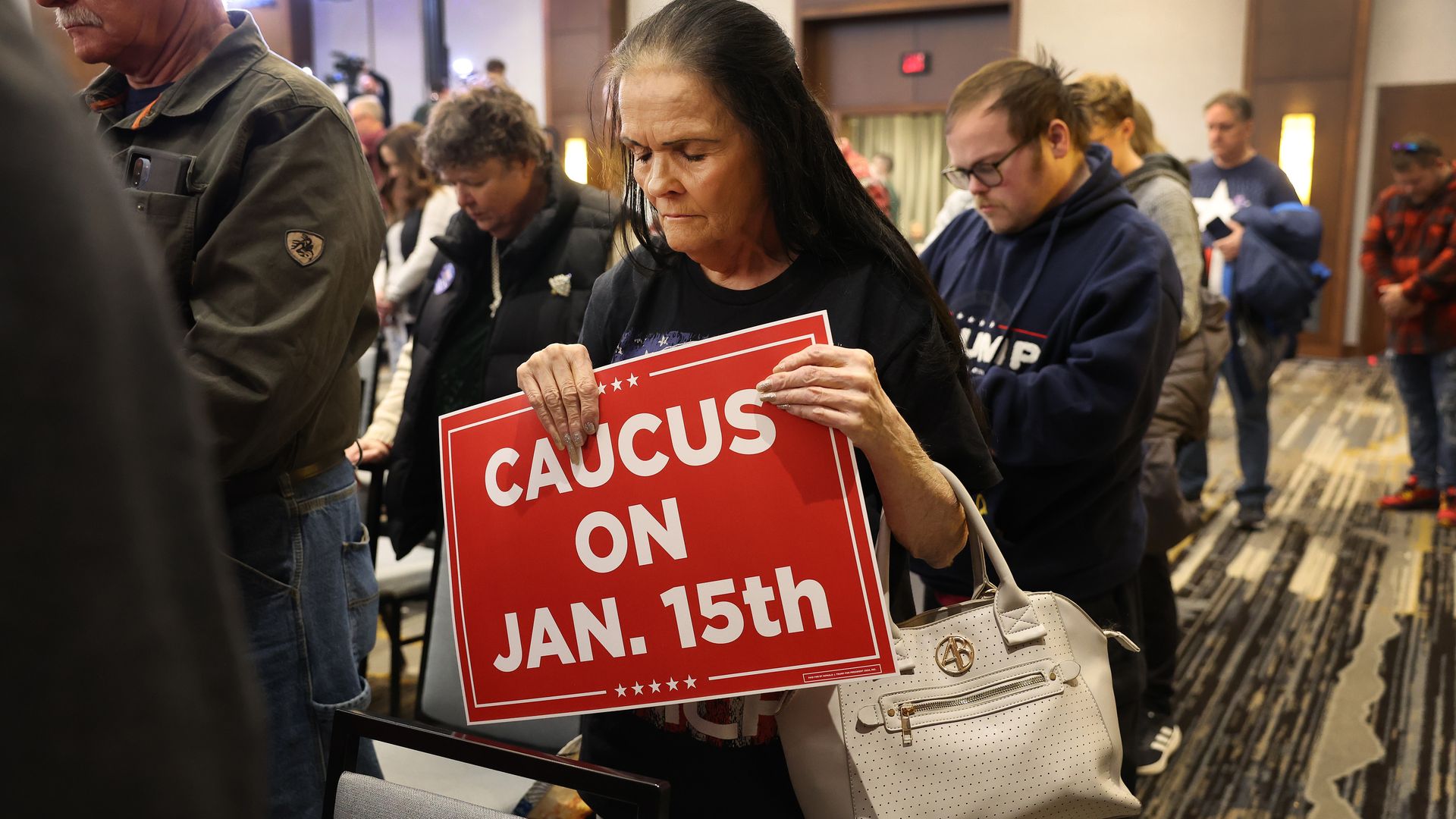As the Iowa Caucus approaches, a convergence of frigid weather and political drama sets the stage for a captivating event.
The caucus, renowned for its significance in shaping presidential campaigns, is not without its challenges. While Republican voters will gather in person to cast their votes, the Democratic process takes on a different form this year, with votes being sent by mail.
However, the memories of the technological glitches that plagued the 2020 caucus still linger, raising concerns about the accuracy and efficiency of the process. Moreover, the extreme cold weather predicted for caucus night may pose obstacles for elderly Iowans, a group known for their influential role in this political event.
Table of Contents
Yet, amidst these uncertainties, the unwavering support for former President Donald Trump suggests that the weather conditions may not deter his followers.

Key Takeaways
- The Iowa caucus is an in-person meeting among voters in Iowa, run by parties rather than the state.
- Republican voters cast their votes through a secret paper ballot, while Democrat voters will send their ballots by post to be tallied by March 5.
- The timing of the caucuses can impact the momentum of candidates, and prompt release of results is important for maintaining transparency and public trust.
- The frigid weather forecast for the caucus may affect turnout, but strong support for Trump suggests his supporters may not be deterred.
Iowa Caucus

What are the key elements of the Iowa Caucus, a significant event in the United States political landscape?
The Iowa Caucus holds a rich history and follows specific caucus rules and procedures.
The Iowa Caucus, held every four years, is the first major event in the presidential primary season. It serves as a crucial testing ground for candidates vying for their party’s nomination.

The caucus is run by parties, not the state, and registered Republicans cast their vote through a secret paper ballot. Votes are tallied and winners are announced within a few hours.
Democrat voters, on the other hand, do not vote in person this year; they instead send ballots by post to be tallied by March 5. In previous years, Democrat voters would make speeches and divide into groups based on preferred candidates.
Understanding the Iowa Caucus history and the caucus rules and procedures is fundamental in comprehending the significance of this event.
Importance and Impact of the Iowa Caucus
The Iowa Caucus plays a pivotal role in shaping the trajectory of candidates and measuring their viability and momentum in the presidential primary season. The Iowa caucus results serve as a litmus test for the candidates, providing valuable insights into their popularity and support among voters. While the caucus is not a reliable predictor of the eventual party nominees, it can provide crucial momentum for candidates heading into the New Hampshire primary.
The timing of the caucuses is also significant, as a strong showing in Iowa can generate media attention and help candidates gain traction in subsequent states. However, it is important to note that winning the Iowa caucus does not guarantee success in the overall primary race, as demonstrated by previous Republican winners who did not secure their party’s nomination. The table below highlights the impact and importance of the Iowa Caucus:
| Importance and Impact of the Iowa Caucus |
|---|
| Serves as a litmus test for candidates |
| Provides momentum heading into New Hampshire primary |
| Timing can impact candidate momentum |
| Winning the caucus does not guarantee party nomination |
| Previous winners did not always win the primary race |
Republican Caucus Process

The Republican Caucus process in Iowa begins on Monday at 7pm Central Standard Time. Registered Republicans will gather at their designated precincts to participate in this important event.
Here are some key aspects of the Republican Caucus process:
- Voting logistics: Republicans will cast their votes through a secret paper ballot. This ensures privacy and accuracy in the voting process.
- Caucus rules: The caucuses are run by the Republican Party, not the state. Party officials will oversee the proceedings and ensure that the rules are followed. The votes will be tallied within a few hours, and the winners will be announced promptly.
The Republican Caucus process is an integral part of the Iowa Caucus, providing a platform for Republicans to express their preferences and shape the political landscape. It is an opportunity for the party to gauge support for different candidates and set the stage for the upcoming primary race.
Democrat Caucus Process
The Democrat Caucus process in Iowa involves voter participation through in-person meetings and the use of postal ballots, serving as a platform for party members to engage in party business and carry out their preferences.
However, there are challenges faced by Democrat voters that raise concerns about caucus turnout.
In 2020, technological errors impacted the Democrat caucus, causing delays in the release of results. This year, Democrat voters will not vote in person but instead send their ballots by post to be tallied by March 5th.
The extremely cold weather forecast for the caucus may also affect turnout as elderly Iowans, who play a crucial role in the caucus, may face difficulties reaching the caucus sites.
Despite these challenges, it remains to be seen how turnout will be impacted and how effectively the Democrat caucus process will be carried out.
Weather Impact on Caucus

Despite the challenges faced by Democrat voters in the caucus process, another significant factor that could impact turnout and the overall effectiveness of the Democrat caucus is the weather forecast for Monday night.
The frigid temperatures and harsh conditions pose challenges for voters, particularly the elderly who may face difficulties in reaching the caucus sites. This weather-related obstacle could potentially deter some voters from participating in the caucus, leading to lower voter turnout and potentially impacting the outcome of the caucus.
It is crucial for the organizers to address these challenges and ensure that necessary measures are in place to accommodate and assist elderly voters in navigating the adverse weather conditions.
Ultimately, the weather forecast for Monday night could play a role in shaping the results and determining the success of the Democrat caucus.
Technological Errors in Previous Caucuses
Technological Errors in Previous Caucuses
In previous caucuses, technological errors had a significant impact on the process and the timely release of results. These errors not only affected the efficiency of the caucuses but also had consequences on voter turnout and the overall electoral process. To provide a clearer understanding of the impact of these errors, let’s take a look at a table summarizing the consequences of delayed results in previous caucuses:
| Consequences of Delayed Results | Impact on Voter Turnout |
|---|---|
| 1. Decreased public trust | Reduced enthusiasm |
| 2. Increased confusion | Apathy among voters |
| 3. Loss of momentum for winners | Potential loss of support |
| 4. Media scrutiny | Negative perception |
These technological errors not only affected the release of results but also had a ripple effect on the overall electoral process. The delayed results decreased public trust, increased confusion, and even led to a loss of momentum for the winners. Additionally, media scrutiny intensified, further contributing to a negative perception of the caucuses. These consequences highlight the importance of addressing and preventing technological errors in future caucuses to ensure a smooth and transparent electoral process.
Frequently Asked Questions
How Are Caucus Winners Determined in the Iowa Caucus?
Caucus winners in the Iowa Caucus are determined by the number of votes received in each precinct. The process involves registered Republicans casting secret paper ballots, which are then tallied to allocate delegates to the candidates.
How Does the Iowa Caucus Impact the New Hampshire Primary?
The Iowa Caucus serves as a crucial litmus test for the viability and momentum of candidates heading into the New Hampshire Primary. While not a reliable predictor of eventual party nominees, the results can provide significant momentum for candidates.
What Is the Role of Democrat Voters in the Caucus Process?
Democrat voters in the Iowa Caucus participate by gathering in person to carry out party business, including making speeches and dividing into groups based on preferred candidates. However, they will not vote this year, instead sending ballots by mail to be tallied by March 5.
How Did Technological Errors in the 2020 Democrat Caucus Affect the Release of Results?
Technological errors in the 2020 Democrat caucus resulted in a delay in the release of results, impacting voter confidence and raising transparency concerns. The incident led to calls for caucus reforms and raised questions about party unity and voter disenfranchisement. Media coverage of the issue also affected public perception and potentially voter turnout.
How Does the Weather Affect Turnout in the Iowa Caucus?
The weather can have an impact on voter turnout in the Iowa Caucus. While frigid temperatures may pose challenges, strong support for certain candidates suggests that their supporters may not be deterred.
Conclusion
In conclusion, the Iowa Caucus is a crucial event in the United States’ political landscape that is set to take place amidst frigid weather and heightened political drama.
While the Republican caucus involves an in-person vote, the Democratic caucus this year requires voters to send their votes by post.
The 2020 caucus experienced technological glitches and the extreme cold weather may pose challenges for elderly Iowans.
Nevertheless, the outcome of this event will have a profound impact on the candidates’ momentum and the subsequent course of the presidential race.


